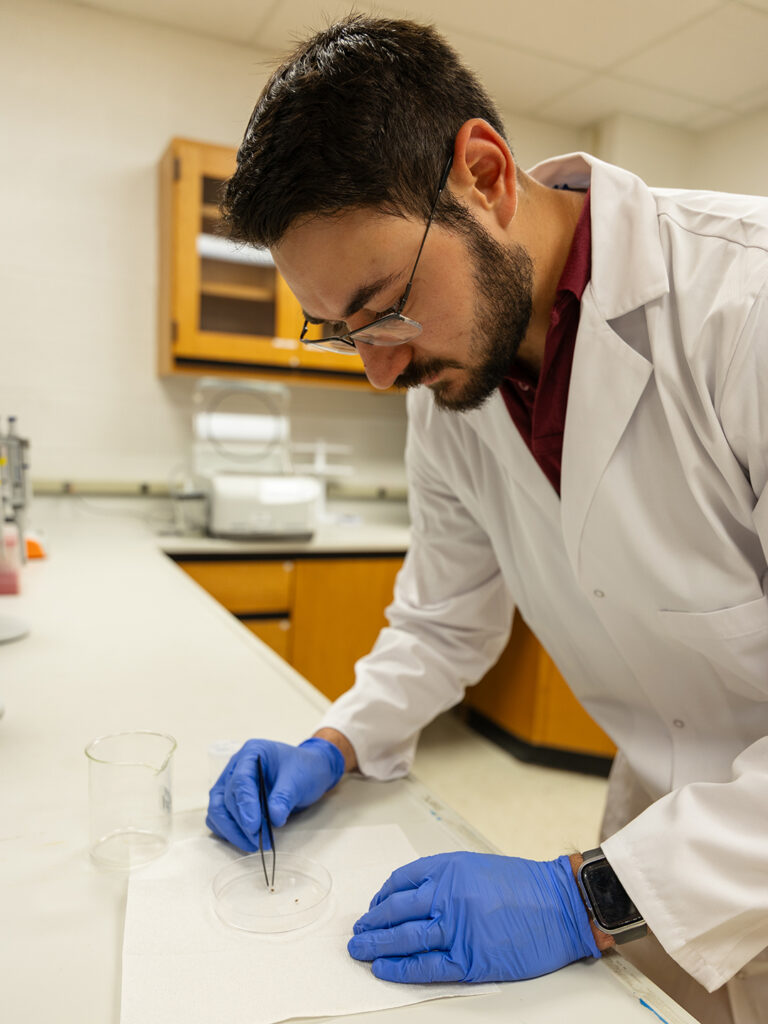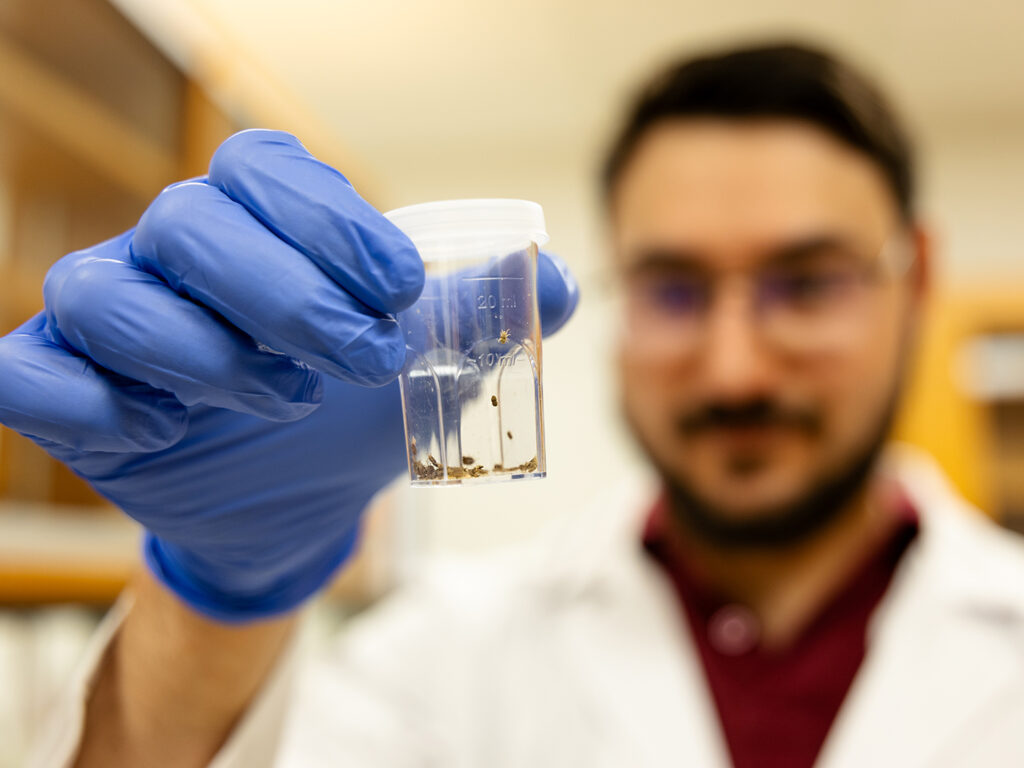Aggie Veterinary Student Embraces Opportunities At VMBS’ Canyon, College Station Campuses
Story by Megan Bennett, VMBS Marketing & Communications

Photos by Karis Olson, Texas A&M School of Veterinary Medicine & Biomedical Sciences
As someone who grew up in Junction, Texas, a small town of less than 2,500 people, third-year veterinary student Isaac Neuman felt right at home at Texas A&M’s Veterinary Education, Research, & Outreach (VERO) campus in the Texas Panhandle when he entered the 2+2 Doctor of Veterinary Medicine (DVM) program in 2022.
Housed on the West Texas A&M University campus, the Texas A&M School of Veterinary Medicine & Biomedical Sciences’ (VMBS) VERO program offers each class of 18 Aggie veterinary students the opportunity to spend the first two years of their DVM education in the rural community of Canyon, Texas.
“The faculty and staff at VERO are just incredible at making you feel like you belong there,” Neuman said. “Being in that small, intimate class size really makes you feel like you’re part of a family.”
For Neuman, his time at VERO was also essential for developing the interests and goals that are shaping his career as a veterinarian.
Finding A Community
Neuman was always surrounded by animals growing up, but he didn’t develop a true interest in veterinary medicine until his freshman year of high school.
“I needed to get some community service hours for National Honor Society,” Neuman recalled. “My English teacher was married to the one vet in Junction and suggested I help him give free vaccines at Rock Springs. I really liked it, and it was a great way to give back to the community. I thought to myself, ‘I think I could do something like this for my career.’”
Having grown up watching Aggie football with his dad and uncle, Neuman knew that Texas A&M was where he wanted to complete his higher education. Texas A&M’s biomedical sciences (BIMS) program also seemed like a perfect fit because of its focus on preparing students for professional medical programs.
Moving to the much larger town of College Station was a bit of a culture shock for Neuman, but he soon found several smaller groups to connect with.
“It was really overwhelming going from a graduating class of 48 to a Monday chemistry class of 300 people,” he said. “Then I took a veterinary entomology course as a BIMS elective and got really interested in entomology, so I decided to double major. The entomology department was small and felt like just what I needed to help ground me and get me through undergrad.”
He also found support through student organizations, including the Pre-Veterinary Society, the Human Environmental Animal Team, and the Undergraduate Entomology Student Organization.

One connection made during those years turned out to be vital in finding his future home at VERO.
“I worked part-time in the Texas A&M Veterinary Medical Teaching Hospital pharmacy, and I was talking to my boss, Dr. Amy Savarino, about my interests in vet med,” Neuman said. “She knew my struggles with huge class sizes and the competitiveness of it, so she told me about VERO. After hearing about the small class size and the focus toward rural mixed practice, I knew that was what I wanted to do.”
Back To Small-Town Living
Neuman graduated with his bachelor’s degree in December 2021, and after spending about half a year working full-time at the pharmacy, he packed his things and moved to the Texas Panhandle.
“It felt weird going from the hustle and bustle of College Station to Canyon, where there’s only 12,000 people and you can walk from one end of campus to the other in 10 minutes,” he said. “But it was honestly exactly what I wanted. I had really missed that small-town vibe.”
Although the campuses are more than 500 miles apart, the VMBS takes great care to ensure that the students at VERO receive the same outstanding education as their classmates in College Station.
“The faculty and staff worked really hard to give us opportunities,” Neuman said. “We even got a lot of opportunities that we wouldn’t have had in College Station, because there were only 18 students in each class, so everyone could participate in everything.”
The large animal focus at VERO led Neuman to discover a new interest within veterinary medicine.
“I enjoy working with all animals, but I have really gotten interested in cattle after being at VERO,” he said. “I worked at a dairy last summer for a couple of weeks and got to see how it operated, and I really enjoyed it. The cows were just so sweet, and I really liked working with them.”
As he got to know his classmates and professors, Neuman was more thankful to be back in a smaller town. As time went on, many of those connections began to feel like family.
“Cade Holden, a VERO student in the DVM class of 2025, and I did an internship together in Las Vegas,” Neuman said. “We were just acquaintances at the time, but when my fiancée came out so we could get married in Vegas, Cade became my best man and we got really close after that.”
When it came time to move to College Station in preparation for the third year of vet school, Neuman was both excited to see old friends again and sad to leave the VERO faculty members he had gotten to know so well.
“Dr. (Lisa) Lunn is the realest person I’ve ever met, and I felt like I could talk to her about anything,” he said. “I also really enjoyed speaking with Dr. (Yvonne) Wikander because she has a different way of thinking that I hadn’t been exposed to before. By the end of her class, I felt like I truly learned the material and didn’t even have to study for the final.
“Starting at VERO, with the small class size and all the opportunities we got there, made me feel really prepared to go into my third year in College Station,” he said.
Exploring New Opportunities

While Neuman has maintained the interest in rural mixed animal practice that he developed in high school, he has also enjoyed finding ways to explore his other interests in public health and vector-borne diseases.
This summer, he’s completing the VMBS’ Veterinary Medical Scientist Research Training Program (VMSRTP) while conducting research with Dr. Meriam Saleh, a veterinary parasitologist and clinical assistant professor at VERO, on how geographic differences may impact the prevalence of the bacteria that causes tick-borne relapsing fever.
“I’ve really enjoyed going out into the field to collect samples of the tick that spreads the bacteria and seeing how my data can have a real impact on public health,” Neuman said.
“My goal is still to do rural mixed practice, but eventually I want to transfer into the public health sector and work with the Centers for Disease Control and Prevention, World Health Organization, or Texas Animal Health Commission,” he said.
There are also many ways Neuman can contribute to public health as a rural practitioner.
“It’s important to be able to correctly explain to clients the best way to care for their animals to protect not only their animals but also themselves,” Neuman said. “For example, not everyone knows how important regular flea and tick preventatives are in reducing the rate of public health concerns like Lyme disease.
“There are so many diseases that are under-diagnosed, so keeping up with continuing education and current literature is also really important for veterinarians, especially rural health practitioners,” he said. “If there’s anything we learned from COVID, it’s that there will always be the potential for pandemics and epidemics, but we can try to mitigate it by staying current with public health knowledge.”
As Neuman prepares for his final two years of veterinary school, he looks forward to expanding his knowledge and continuing on to new experiences, with the goal of becoming even more prepared to serve the community he’ll call home as a veterinarian.
###
For more information about the Texas A&M College of Veterinary Medicine & Biomedical Sciences, please visit our website at vetmed.tamu.edu or join us on Facebook, Instagram, and Twitter.
Contact Information: Jennifer Gauntt, Director of VMBS Communications, Texas A&M College of Veterinary Medicine & Biomedical Sciences, jgauntt@cvm.tamu.edu, 979-862-4216


